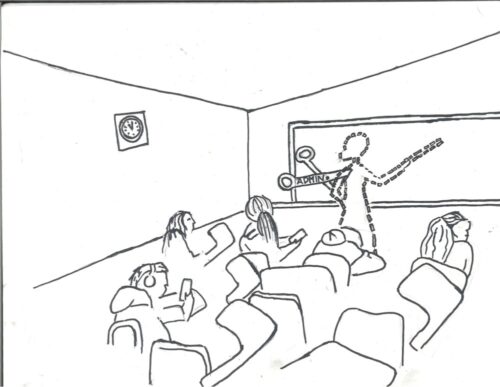Faculty Dispute Vurdien’s Version of Layoffs’ Impact
By Annette Mullaney
Despite Interim Chancellor Rajen Vurdien’s and City College administrators’ repeated promises that faculty layoffs and course cuts will not result in any academic programs being discontinued, many faculty members claim they will.
The cuts, part of the five-year budget plan passed by the board in November, will reduce credit and noncredit course offerings next year by 20% and 24% respectively, measured in full-time equivalent faculty (FTEF), a standardized measure of instructor workload.
Up to 163 full-time faculty and hundreds of part-time faculty, according to faculty union AFT2121, have received notices of potential layoffs as part of the plan to address City College’s structural budget deficit.
Despite the precipitous cuts, Vurdien has promised on numerous occasions that no programs will be eliminated. At the November board meeting he went further, saying “there will be enough sections so that not a single one of the courses that we offer on a regular basis will be eliminated.”
At the contentious Feb. 25 board meeting where the full-time faculty layoff notices were approved by a 5-2 vote, Vice Chancellor of Academic Affairs Tom Boegel presented the preservation of degree and certificate programs as the administration’s guiding principle. “We started our planning for next year based on a simple assertion: that we would preserve each of the certificate and degree programs,” he said.

Yet in numerous forums — public comments at board meetings, online teach-ins, a rally held at City Hall March 12, conversations among faculty representative bodies and on social media — faculty have disputed this claim, speaking instead of broad and devastating programmatic impacts.
“We have a couple of programs that are primarily taught by part-timers, which are real estate and entrepreneurship — those are going to be gone just because we cut the part-timers,” said business department faculty member Carole Meagher.
According to information gathered by the Department Chairperson Council (DCC) several departments claim that they will not be able to offer specific certificates or degrees. The aircraft maintenance technology department “will have no faculty left at all” if the layoffs go through, as reported by the DCC; the earth sciences, horticulture, LGBT studies, music, physical education, and visual media design departments all believe there are specific degrees and certificates that they won’t be able to offer next year.
In addition, several departments have expressed concern about the impact the course cuts and layoffs will have on their accreditation standing with outside bodies, including registered nursing, radiology, and child development & family studies.
Citing these losses of degrees and certificates, the Academic Senate passed a resolution on March 10 stating that the administration and Board of Trustees are out of compliance with their own policies and state regulations. Specifically, they point to policies that require a collaborative process to discontinue a program, which the Academic Senate says has not been present, and a lack of plans for current students in eliminated programs to finish.
In response to calls for more data transparency, including from trustees at the Feb. 25 board meeting, Boegel presented a more in-depth description of the process and data guiding cuts at the board’s March 11 student success and policy meeting.
Boegel did not directly address the disconnect between faculty and the administration on whether programs will be eliminated. He did point out that the majority of degrees and certificates were awarded to fewer than 10 students in 2019-20. “It’s important to consider the expected number of completions that we’re going to have in each of these programs,” he said.
In addition to preserving programs, he said they focused on the full-time equivalent student to faculty (FTES/FTEF) ratio — essentially, the number of students each faculty member instructs. In calendar year 2019, the college averaged 14.4 students per instructor (13.8 for credit classes, 16.9 for noncredit), with departments ranging between 3.9 for noncredit licensed vocational nursing to 34.4 for noncredit learning assistance. With the cuts, the college aims to have 13.8 students per faculty in 2021-22.
Despite the focus on student-to-faculty ratios, many departments complain of cuts to full classes. According to the DCC information, one cinema class with sections on the block “has had 50 people show up on the first day hoping to add.”
Many have also complained that the cuts don’t take into account the differing costs and revenues between classes.
The Rebuild City College campaign claims that by cutting disabled student programs and services (DSPS) courses, facing 40% cuts, the college is “leaving money on the table,” since the college receives money from a separate state fund for each student and class. Moreover, funding for disabled students and accommodations increased such that this year DSPS is serving 100 fewer students but received over $200,000 more from the state, according to department chair Muriel Parenteau.
Deputy Chancellor Dianna Gonzales said this characterization is not quite accurate. “Almost all of the classes being cut are funded out of the unrestricted fund,” she said, as opposed to directly from the state.
In response to a question about differing profitability between classes, Boegel said the enrollment management committee has created a data subcommittee that is looking into it. “Our work ahead in the next couple of years has to be for us to look at the relative proportions of the different kinds of classes that we’re running here at the college,” Boegel said.
